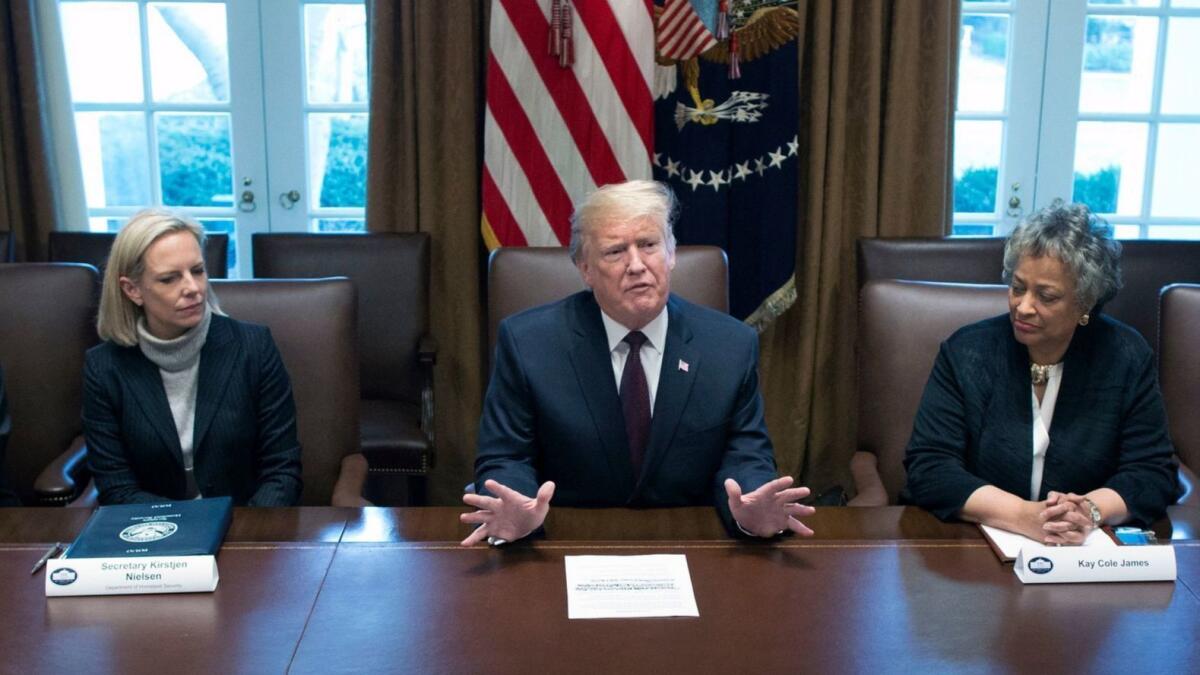Opinion: Immigration is Trump’s key issue, but he still has no idea how our ‘visa lottery’ works

- Share via
Remember back in the distant hazy past — June 16, 2015, to be precise — when Donald Trump declared his candidacy and derided Mexican immigrants by trotting out the canard that “when Mexico sends its people, they’re not sending their best. … They’re sending people that have lots of problems, and they’re bringing those problems with us [sic]. They’re bringing drugs. They’re bringing crime. They’re rapists. And some, I assume, are good people.”
Notwithstanding that tacked-on qualifier at the end, Trump incorrectly implied that people seeking to immigrate to the U.S. somehow are being selected and sent by governments that use the process to shed themselves of bad actors. And not just Mexico.
“It’s coming from all over South and Latin America, and it’s coming probably — probably — from the Middle East,” Trump said. “But we don’t know. Because we have no protection and we have no competence, we don’t know what’s happening.”
Well, that last bit is accurate — Trump didn’t know what was happening then, and he still doesn’t know.
He repeated that false construct Wednesday in a White House meeting with conservatives aimed at shoring up his shaky position in shutting down the government over his insistence on “a great big beautiful wall” on the U.S.-Mexico border.
Does anybody think they’re putting their best people in?
— President Trump
“If you take a look at the visa lottery — when there’s a lottery, do you think they’re putting their best people into those lotteries?” Trump said at the start of the meeting. “It’s a lottery. You know what a lottery is. Does anybody think they’re putting their best people in?”
(The president also repeated the lie that the allegedly Islamic State-inspired man who drove a truck down Manhattan’s Westside in 2017, killing eight people and injuring a dozen more, had “brought in many people” through the family visa program, which immigration hard-liners refer to as chain migration, an expanded use of the academic term for people from one geographic area resettling in the same place.)
It’s even money whether Trump is flat-out ignorant of how the immigration visa process works, or whether he has a general idea — he’s hired and been married to enough immigrants that he ought to — but pushes these falsehoods just to muddy waters and keep his base in full manipulated outrage.
But here’s the truth: People deciding to move to the U.S. aren’t selected by their governments, including those entering the lottery (formally known as the Diversity Immigrant Visa Program), which seeks to balance out the national origins of the pool of people granted permission each year to immigrate.
Enter the Fray: First takes on the news of the minute »
Here’s how it works: The government sets aside 50,000 visas available for people from nations with low immigration rates to the U.S., and no nation can account for more than 7% of the total. People apply at U.S. consulates in their home countries, must meet general immigration eligibility (no serious criminal convictions nor a likelihood to become a public charge, for instance), and must have at least a high school education and “two years of work experience within the past five years in an occupation that requires at least two years of training or experience to perform.”
Not neurosurgeons, but also not a pool of miscreants and plotting evildoers as the president imagines. Those eligible for consideration are placed in a pool, and the visas are awarded to people drawn at random.
There is a legitimate debate to be had over whether the diversity lottery is worth keeping. It amounts to roughly 10% of the annual immigrant visas issued (the vast majority go to people with relatives already in the U.S.). The program began in the 1980s in an effort to add more immigrants from Ireland and Italy who faced long delays in obtaining family visas because of national caps and huge backlogs. At the time, both countries faced significant economic problems, but as those economies stabilized, and with the advent of the European Union, there was less demand, and more of the visas began going to people from African and Asian countries.
It is worth keeping? I think so. While I question its roots, it’s good that it has morphed into a way for folks who don’t have relatives in the U.S. to have a shot at the American dream, which is largely how this nation was built. And the more diverse we are as a society, the better we are, notwithstanding the predominant views in the White House.
But to end it because the president and his hard-line friends think it allows other countries to send us “not their best?”
No.
More to Read
A cure for the common opinion
Get thought-provoking perspectives with our weekly newsletter.
You may occasionally receive promotional content from the Los Angeles Times.










